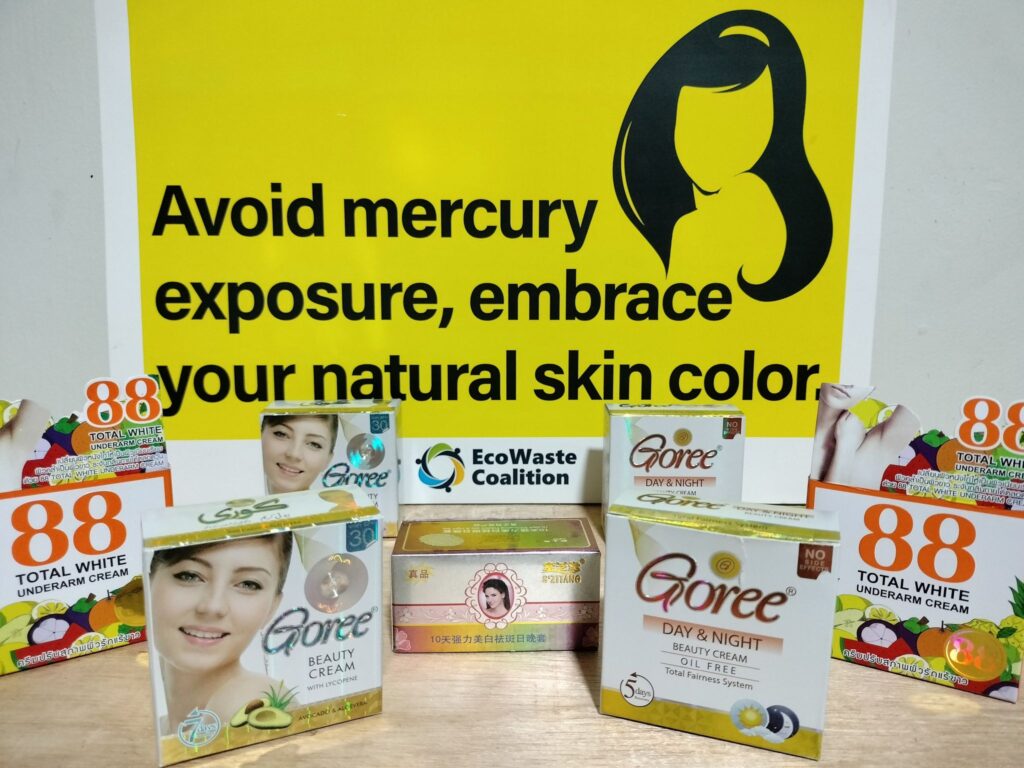
| EcoWaste Coalition photo
LAPU-LAPU CITY, Cebu — EcoWaste Coalition said that seven banned ‘mercury-containing’ facial creams are still being sold by some cosmetics vendors in the tri-cities of Cebu, Mandaue and Lapu-Lapu.
Quoting the outcome of a monitoring that they did on September 26, 2023, the sales of these skin-lightening products continue despite the global phase-out that is stipulated in the Minamata Convention on Mercury, a global agreement that seeks to protect human health and the environment from mercury emissions and releases, Aileen Lucero, national coordinator of EcoWaste Coalition, said in a statement.
“We have gathered fresh evidence showing the unchecked trade in Cebu of unauthorized cosmetics contaminated with high levels of mercury, an extremely toxic chemical forbidden in cosmetic product formulations, in violation of national and international laws,” Lucero said.
Based on the outcome of their monitoring, Lucero said, they will have to notify health product regulators and the concerned local government units (LGUs) about this brazen threat to human health and the environment.
At the same time, she is also urging the three LGUs to go after the errant peddlers of these poisonous cosmetics and their suppliers.
“City ordinances banning mercury-added cosmetics and public information drives promoting acceptance of our natural skin color should be pursued to fight colorism and mercury exposure via chemical skin whiteners,” Lucero added.
The banned products include Pakistan-made Goree Beauty Cream with Lycopene and Goree Day & Night Beauty Cream, Thailand-made 88 Total White Underarm Cream, and China-made S’Zitang 10-Day Eliminating Freckle Day & Night Set.
According to Lucero, samples of these products were brought to the EcoWaste Coalition’s office in Quezon City for mercury screening using a portable X-ray fluorescence (XRF) analyzer, a device that can identify and quantify chemicals in a sample without sample preparation or destruction.
Lucero said that all the seven products badly failed the XRF mercury screening test.
The four Goree samples were found to contain extremely high levels of mercury ranging from 27,130 to 29,550 ppm. The two samples of 88 Total White had 2,147 and 2,952 ppm while the lone sample of S’Zitang contained 1,109 ppm (day cream) and 109 ppm (night cream).
Aside from being banned by the Food and Drug Administration (FDA) in 2017 for its lack of market authorization and high mercury content, Goree has also been tested and subsequently banned in Bangladesh, Brunei Darussalam, Hong Kong, New Zealand, Singapore, United Kingdom, and the USA.
New Zealand, which also bans the two variants of Goree in 2021, warned that “these products contain mercury, which is dangerous to your health, and on the lungs, kidneys, skin and eyes. It can also affect the development of unborn babies.”
FDA Advisory Nos. 2018-183 and 2015-025 cautioned the public against the purchase and use of S’Zitang, which the agency tested and found to contain toxic mercury levels above 1 ppm.
In 2021, the FDA issued a public health warning on 88 Total White Underarm Cream through Advisory No. 2021-1187, saying it has no valid Certificate of Product Notification (CPN) and the use of which “may pose health risks to consumers.” / dcb
RELATED STORIES
Consumers in Cebu told to avoid buying banned beauty products from China
Consumers told: Don’t buy toxic ‘squeaky chicken’ toy